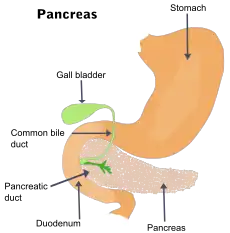Pancreas
The pancreas is an organ that makes hormones and enzymes to help digestion. The pancreas helps break down carbohydrates, fats, and proteins. The pancreas is behind the stomach and is on the left side of the human body.

The part of the pancreas that makes hormones is called the Islets of Langerhans. The Islets of Langerhans are a small part (2%) of the total cells in the pancreas. The Islets of Langerhans change which chemical they make depending on how much of other chemicals are already in the blood. So, the pancreas works to keep the level of chemicals in balance in the body. If the Islets of Langerhans stop working, a person will suffer from a disease called diabetes. Doctors are experimenting with taking the Islets of Langerhans cells from a donor body and putting them into the pancreas of a person with diabetes to make that person well.[1][2]
The pancreas belongs to two systems of the body: the digestive system for its role in breaking down nutrients, and the endocrine system for producing hormones.
Hormones
The pancreas releases these hormones:
Digestive enzymes
The pancreas releases many different enzymes to help digestion:
- Lipase (which breaks down fats)
- Amylase (which breaks down carbohydrates)
- Trypsinogen and Chymotrypsin (which break down proteins)
- Erepsin, which digests peptones into amino acids.
References
- Meloche RM (2007). "Transplantation for the treatment of type 1 diabetes". World Journal of Gastroenterology. 13 (47): 6347–55. doi:10.3748/wjg.13.6347. PMC 4205453. PMID 18081223.
- Hogan A, Pileggi A, Ricordi C (2008). "Transplantation: current developments and future directions; the future of clinical islet transplantation as a cure for diabetes". Frontiers of Bioscience. 13 (13): 1192–205. doi:10.2741/2755. PMID 17981623.
{{cite journal}}: CS1 maint: multiple names: authors list (link)
Other websites
- Pancreatic Cancer Info Archived 2018-03-07 at the Wayback Machine